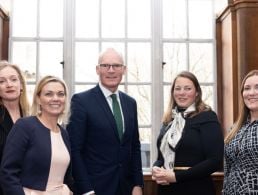Enterprise Ireland revealed in its end-of-year statement that firms backed by the agency created a total of 18,033 jobs in 2013, a net increase of 5,442 jobs – the highest net gain for Irish companies in more than a decade.
Total direct employment in Enterprise Ireland client companies stood at 175,750 in 2013, out of which 149,718 were full-time jobs and 26,032 part time.
Directly and indirectly, Enterprise Ireland-backed companies account for more than 300,000 jobs in the Irish economy – 16pc of the country’s workforce.
New job commitments made by Enterprise Ireland clients in 2013 amounted to more than 7,100 – exceeding the target of 6,250 for the year.
Enterprise Ireland quoted IMF predictions that global growth is to strengthen by 3.6pc in 2014.
Stand-out jobs announcements of 2013 include food company Glanbia, which is creating 1,600 direct and indirect jobs on the Kilkenny/Waterford border, as well as 90 jobs in Monaghan and Dublin, and call centre player Eishtec, which is creating 250 new jobs, bringing total employment in the company to 960 people.
In 2013, Enterprise Ireland invested in 97 high potential start-ups (HPSUs), which combined aim to employ 1,600 new staff and target €300m in annual sales.
During 2013, a number of Irish companies were acquired by multinational companies (MNCs), including The Now Factory (acquired by IBM), Open Hydro Group Ltd (acquired by DCNS SA), Quintillion Holding Co Ltd (acquired by Bancorp Inc), Storyful Ltd (acquired by News Corporation Inc), and Mapflow Ltd (acquired by Reed Elsevier Plc).
Advanced economies, where the lion’s share of client exports go to, are expected to be the main source of global growth in 2014.
“The performance of Enterprise Ireland client companies over the past year is very heartening,” said Enterprise Ireland’s chief executive Julie Sinnamon.
“Once again, they have continued to increase employment, recording the highest net gain in the last decade. This is no mean achievement, considering the highly challenging business environment they are competing in.
“Enterprise Ireland’s strategy for 2014-2016 is very clearly focused on making sure that they are supported in every way possible to continue this upwards growth. Our priority is to support entrepreneurship across the regions, and develop strong, export-focused, ambitious Irish companies that can win new business and jobs for Ireland,” Sinnamon said.
Growth initiatives
During the year, Enterprise Ireland embarked on a number of new initiatives for entrepreneurs, including a €250,000 Competitive Feasibility Fund for Female Entrepreneurs.
The agency also launched an Access Silicon Valley Initiative to fast-track firms targeting San Francisco and the Bay Area in California, as well as the SPRINT initiative to help founders in the digital-content sector shorten the timescale from product development to paying customers.
The €21m Commercialisation Fund was made available to researchers in the third-level sector to commercialise research and inventions.
A €175m Seed and Venture Capital Fund was created that could be leveraged to more than €700m by 2018.
Two other funds were set up during the year, including the €20m Innovation Fund Ireland investment with Highland Capital Partners Europe, as well as the €125m Growth Capital Ireland Fund.
As well as launching the ‘Education in Ireland’ strategy to encourage overseas students to study at third and fourth level, a €1m data analytics and big data research programme was established.
A total of 27 spin-out companies emerged from the higher-education sector and more than 100 companies were created via the New Frontiers on-campus entrepreneurial training initiative.
As well as this, more than 780 firms were collaborating with Ireland’s higher-education system to boost product development and explore new market opportunities.
“Huge credit is owed to all at Enterprise Ireland for delivering these results,” the Minister for Jobs, Enterprise and Innovation Richard Bruton said.
“This is the second year in a row that employment in Irish exporting companies has shown significant growth, after several years in which jobs were shed. These results – the latest in a line of positive indicators for the Irish economy – give confidence for the future. I am determined to continue implementing our plan so that we can build on this momentum and get people back to work.”






